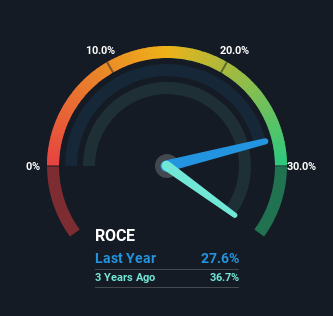- India
- /
- Commercial Services
- /
- NSEI:RADIANTCMS
Investors Could Be Concerned With Radiant Cash Management Services' (NSE:RADIANTCMS) Returns On Capital

If we want to find a stock that could multiply over the long term, what are the underlying trends we should look for? Ideally, a business will show two trends; firstly a growing return on capital employed (ROCE) and secondly, an increasing amount of capital employed. If you see this, it typically means it's a company with a great business model and plenty of profitable reinvestment opportunities. So when we looked at Radiant Cash Management Services (NSE:RADIANTCMS), they do have a high ROCE, but we weren't exactly elated from how returns are trending.
Return On Capital Employed (ROCE): What Is It?
For those that aren't sure what ROCE is, it measures the amount of pre-tax profits a company can generate from the capital employed in its business. The formula for this calculation on Radiant Cash Management Services is:
Return on Capital Employed = Earnings Before Interest and Tax (EBIT) ÷ (Total Assets - Current Liabilities)
0.28 = ₹645m ÷ (₹2.8b - ₹471m) (Based on the trailing twelve months to December 2023).
So, Radiant Cash Management Services has an ROCE of 28%. In absolute terms that's a great return and it's even better than the Commercial Services industry average of 18%.
View our latest analysis for Radiant Cash Management Services

While the past is not representative of the future, it can be helpful to know how a company has performed historically, which is why we have this chart above. If you're interested in investigating Radiant Cash Management Services' past further, check out this free graph covering Radiant Cash Management Services' past earnings, revenue and cash flow.
The Trend Of ROCE
In terms of Radiant Cash Management Services' historical ROCE movements, the trend isn't fantastic. Historically returns on capital were even higher at 58%, but they have dropped over the last five years. On the other hand, the company has been employing more capital without a corresponding improvement in sales in the last year, which could suggest these investments are longer term plays. It's worth keeping an eye on the company's earnings from here on to see if these investments do end up contributing to the bottom line.
On a related note, Radiant Cash Management Services has decreased its current liabilities to 17% of total assets. Since the ratio used to be 77%, that's a significant reduction and it no doubt explains the drop in ROCE. What's more, this can reduce some aspects of risk to the business because now the company's suppliers or short-term creditors are funding less of its operations. Since the business is basically funding more of its operations with it's own money, you could argue this has made the business less efficient at generating ROCE.
In Conclusion...
To conclude, we've found that Radiant Cash Management Services is reinvesting in the business, but returns have been falling. And investors appear hesitant that the trends will pick up because the stock has fallen 10% in the last year. On the whole, we aren't too inspired by the underlying trends and we think there may be better chances of finding a multi-bagger elsewhere.
One more thing, we've spotted 1 warning sign facing Radiant Cash Management Services that you might find interesting.
High returns are a key ingredient to strong performance, so check out our free list ofstocks earning high returns on equity with solid balance sheets.
New: AI Stock Screener & Alerts
Our new AI Stock Screener scans the market every day to uncover opportunities.
• Dividend Powerhouses (3%+ Yield)
• Undervalued Small Caps with Insider Buying
• High growth Tech and AI Companies
Or build your own from over 50 metrics.
Have feedback on this article? Concerned about the content? Get in touch with us directly. Alternatively, email editorial-team (at) simplywallst.com.
This article by Simply Wall St is general in nature. We provide commentary based on historical data and analyst forecasts only using an unbiased methodology and our articles are not intended to be financial advice. It does not constitute a recommendation to buy or sell any stock, and does not take account of your objectives, or your financial situation. We aim to bring you long-term focused analysis driven by fundamental data. Note that our analysis may not factor in the latest price-sensitive company announcements or qualitative material. Simply Wall St has no position in any stocks mentioned.
About NSEI:RADIANTCMS
Radiant Cash Management Services
Engages in the provision of cash logistics and other related services in India.
Excellent balance sheet second-rate dividend payer.
Similar Companies
Market Insights
Community Narratives




